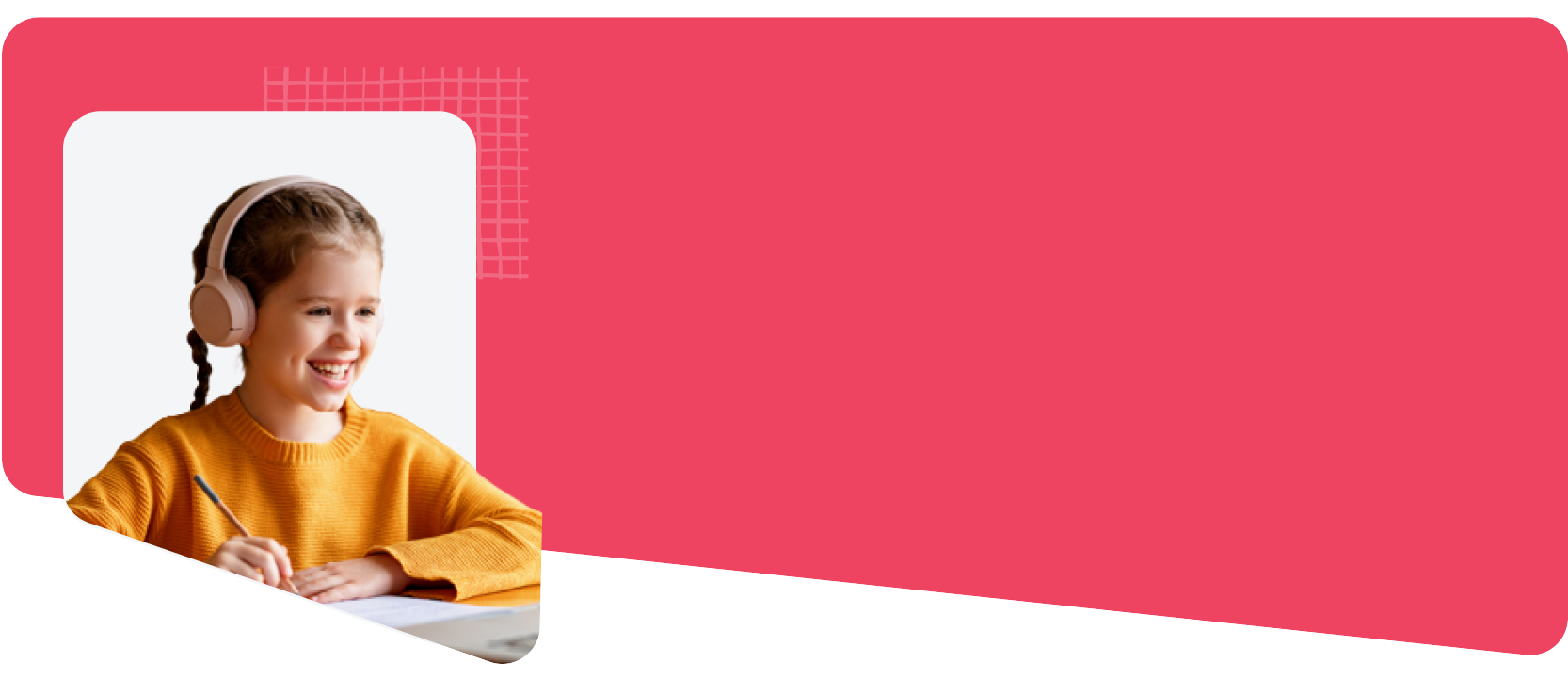Does it ever happen to you that you look at your child’s schedule for the week and feel like they’re overpacked? And despite the overpacked schedule, they are struggling in the class? We understand that it can be difficult to provide the right amount of time and academic support amidst your busy schedules.
However, this is something that can be solved. The simple solution to all your problems is early literacy and high school English tutoring classes. Early literacy skills form the bedrock of a child's cognitive development, influencing everything from reading comprehension to writing abilities. But as students transition into high school, many find themselves grappling with increasingly complex English curricula. It’s here that those foundational skills become critical. Without them, excelling in more advanced studies becomes a real challenge.
So, why are early literacy skills so important? And what happens when a student’s literacy development falls behind? More importantly, how can high school English tutoring in Sydney help bridge the gap between the basics and the tougher demands of high school English?
In this blog, let’s answer these questions by unpacking the significance of early literacy. We’ll explore the benefits and challenges of literacy development, and highlight the crucial role tutoring plays in ensuring students succeed. Stick around, and by the end, you’ll understand how targeted tutoring services can help students thrive at every stage of their academic journey, from primary to high school. Let’s get moving!
Significance of Early Literacy Skills
Early literacy skills are the cornerstone of a child’s educational success. When nurtured from a young age, these skills help students build strong abilities in reading, writing, and comprehension. Research consistently shows a strong link between early language proficiency and future academic achievement. By establishing these foundational skills early, children are better equipped to handle the increasing complexities of high school English and beyond.
Benefits of Early Literacy Skills
-
Enhances reading comprehension, making it easier to understand and analyze complex texts.
-
Improves writing abilities, allowing students to express their thoughts clearly and effectively.
-
Strengthens cognitive development, boosting critical thinking and problem-solving skills.
-
Builds a strong foundation for future academic success, from primary school through high school and beyond.
-
Increases confidence and reduces anxiety which can be helpful during assessments like NAPLAN and Selective School tests.
-
Promotes lifelong learning, helping students succeed not just in school, but in life.
Now, let’s move and take a closer look at the components of early literacy skills.
Components of Early Literacy Skills
Early literacy skills are the foundational blocks upon which all subsequent reading, writing, and communication skills are built. Understanding these components offers valuable insights into why early exposure to literacy is crucial for young children.
-
Phonemic Awareness
Children with phonemic awareness can hear, identify, and manipulate individual sounds—phonemes—in spoken words. This skill is a precursor to phonics and crucial for learning to read and write. Effective early literacy programs often incorporate playful, sound-based activities that encourage children to discern and play with different sounds within words.
-
Phonics
Phonics involves understanding the relationships between letters and sounds in a language. Unlike phonemic awareness, which is about sounds in isolation, phonics connects these sounds to their written representations. Structured literacy approaches emphasize phonics through explicit instruction, which research has shown to be highly effective, particularly for students who might not have strong literacy foundations at home.
-
Vocabulary Development
A broad vocabulary is fundamental for reading comprehension and effective communication. Early literacy programs aim to expand a child's vocabulary through various methods like storytelling, reading aloud, and engaging in conversations that introduce new words in context. The richer a child’s vocabulary, the better equipped they are to understand and enjoy more complex texts as they grow.
-
Reading Comprehension
Reading comprehension is the ability to understand and interpret what is being read. It goes beyond recognizing words to grasping the meaning, context, and implications of written text. Developing this skill involves asking questions, making predictions, and summarizing stories. Incorporating group reading sessions and interactive discussions about stories can significantly boost a child’s comprehension abilities.
-
Writing Skills
Writing is the act of forming letters and words to express thoughts, ideas, and information. Early writing skills can range from simple letter formation to creating coherent sentences and short stories. Encouraging children to write their own stories or keep journals helps nurture their ability to organize thoughts and communicate effectively. Methods like writing prompts and guided writing sessions can greatly enhance these skills.
-
Phonological Awareness and Environmental Print
In addition to the main components, phonological awareness—the ability to recognize and manipulate sounds within words—contributes significantly to reading and writing development. Moreover, introducing children to environmental print, such as signs, labels, and menus, helps them understand the practical application of literacy in everyday life.
Now, let’s see the common challenges faced by children in developing early literacy skills.
Challenges in Developing Early Literacy Skills
Developing early literacy skills isn't just about teaching children to read and write; it's a multifaceted challenge that involves recognizing and addressing various barriers.
-
Diverse Learning Paces
Every child develops literacy skills at their own speed. Speech and language challenges can delay progress, leading to academic struggles down the road. Early intervention is key for children facing these hurdles.
-
Lack of Resources
Many under-resourced communities lack access to quality literacy tools. This gap can perpetuate educational disadvantage, but initiatives like mobile literacy apps aim to bridge this divide.
-
Parental Involvement
Parents play a vital role in early literacy. Daily reading and interactive literacy activities can greatly enhance a child’s language skills, especially in homes with fewer resources.
-
Addressing Learning Disabilities
Children with learning disabilities like dyslexia need specialized support to develop literacy. Unfortunately, financial barriers and long wait times make it harder for some to access help, highlighting the need for diverse support options.
-
Cultural Diversity
In Sydney’s multicultural landscape, supporting bilingual children is essential. A strong foundation in their first language boosts their English learning and cognitive development.
-
Community Engagement
A collaborative effort between parents, educators, and the community provides consistent support, ensuring children have the tools to succeed in literacy development.
Now that we’re aware of the challenges, let’s take a closer look at the literacy tutoring programs in Sydney.
High School English Tutoring Programs in Sydney
Sydney offers a wide range of high school English tutoring programs tailored to meet the diverse needs of students. These services range from one-on-one sessions with highly qualified tutors to more structured programs in established tutoring centers.
Whether students need help with foundational literacy, NAPLAN preparation, or mastering complex HSC concepts, these programs cater to different learning styles, ensuring flexibility and personalized support. The right program can make all the difference in a student’s academic performance and confidence. Here’s what to Look for in a High School English Tutoring Program:
-
Qualified Tutors
It’s essential to choose programs with tutors who have strong academic backgrounds, especially those with expertise in the NSW curriculum and HSC standards. Look for tutors with high academic achievements, experience in teaching, or even state-ranked qualifications. This ensures they understand the challenges students face and can offer the best guidance to improve both academic performance and confidence.
-
Customization
The most effective tutoring programs tailor their lessons to each student’s unique learning style and needs. Programs offering diagnostic assessments at the start can identify areas for improvement and adapt their teaching methods accordingly. This personalization helps students grasp difficult concepts and makes learning more engaging and productive.
-
Methodology
A good tutoring program will align its curriculum with the student’s schoolwork and the NSW educational requirements. This ensures that the tutoring supports what the student is learning in school. Check if the program includes a structured curriculum with clear goals, as well as the use of modern teaching tools to enhance comprehension and retention.
-
Flexibility
With students juggling school, extracurriculars, and personal commitments, flexibility is key. Consider whether the tutoring service offers options like in-person sessions, online tutoring, or a combination of both. Flexible scheduling ensures students can attend sessions at times that fit their busy routines, making it easier to stay consistent with their learning.
-
Focus Areas
It’s important to choose a program that addresses the student’s specific academic challenges. Some services specialize in essay writing, creative writing, or reading comprehension, while others focus on exam preparation like NAPLAN or HSC. A tutoring program that aligns with the student’s immediate academic needs will have the most impact on their progress.
-
Progress Tracking
Regular feedback and progress reports are essential for monitoring a student’s improvement. The best programs offer weekly or monthly assessments that track how well students are absorbing the material. This not only helps students stay motivated but also allows tutors to adjust their teaching strategies to ensure consistent progress.
Now, let’s see how early literacy skills can be integrated into high school tutoring.
Integration of Early Literacy Skills into High School Tutoring
When it comes to English tutoring in high school, integrating foundational early literacy skills can make all the difference. This approach not only reinforces what students have learned but ensures they have a solid base to build upon.
-
Bridging the Gap between Early Literacy and High School Curriculum
A key aspect of effective tutoring is bridging the gap between early literacy and high school English. Tutors often find that reinforcing foundational literacy skills—like phonological awareness and letter-sound knowledge—enhances comprehension and writing abilities in high school. By building on these early skills, students can tackle advanced tasks like essay writing and storytelling with greater ease and confidence.
-
Techniques to Reinforce Early Literacy Skills
Using a structured, research-based curriculum is essential. Tutors employ creative exercises, such as text breakdowns and analysis, to enhance reading comprehension and essay writing. Frequent revision and personalized feedback help reinforce learning, making early literacy skills intuitive for more complex material.
-
Continuous Assessment and Feedback
Regular assessment and feedback are crucial for progress. By conducting weekly progress reviews and employing pre- and post-testing, tutors can tailor their instruction to each student’s needs, addressing weaknesses and building on strengths for continuous improvement.
-
Role of Technology and Digital Tools
Technology enriches the learning experience, offering flexible and interactive tutoring sessions. Digital tools, such as reading games and storytelling platforms, engage students while reinforcing key skills. Online tutoring makes resources accessible, ensuring students receive support from home while staying engaged in a tech-savvy environment.
By blending foundational literacy with tailored techniques, continuous feedback, and digital tools, tutoring creates a strong, supportive foundation for students to thrive academically.
Let’s explore some basic things to look for when choosing the right literary tutoring service for your child.
Choosing the Right Literacy Tutoring Service in Sydney
Choosing the right tutoring service in Sydney can significantly impact a student's academic journey, especially in a subject as crucial as English. Here's a comprehensive guide to help you make the best choice.
-
Criteria for Selecting a Tutoring Service
When selecting a tutoring service, it's essential to consider several criteria:
-
Qualifications and Experience: Ensure that the tutors are tertiary qualified and have ample experience in teaching literacy and numeracy. This is particularly important for students with learning difficulties or disabilities.
-
Learning Format: Depending on your child's learning preferences, look for services that offer both face-to-face and online tutoring. This flexibility can accommodate different learning needs and schedules, making it easier to find a suitable tutor.
-
Personalized Learning Plans: Seek services that provide tailored learning plans. These plans should address your child's specific strengths, weaknesses, and learning goals, ensuring that the tutoring is effective and targeted.
-
Price and Value: Compare prices among various services. Some tutoring services offer free initial lessons or discounts for package deals, which can be a cost-effective way to start.
-
Questions to Ask Potential Tutors
To ensure you're choosing the right tutor, consider asking the following questions:
-
Teaching Approach: What is your teaching approach, and how do you tailor it to individual students?
-
Experience: What experience do you have with students of similar age and learning needs?
-
Measuring Progress: How do you measure progress and set goals for students?
-
Resources: What resources and materials do you use in your tutoring sessions?
-
Communication: How do you communicate with parents about student progress?
-
Special Needs: How do you handle students with learning difficulties or disabilities?
-
Success Stories: Can you provide examples of successful student outcomes or testimonials?
-
Evaluating the Success of Tutoring Programs
To truly gauge the effectiveness of a tutoring program, consider the following:
-
Assessments: Look for services that conduct initial and ongoing assessments to measure student progress. This will help tailor the tutoring sessions to the student's evolving needs.
-
Regular Updates: Ensure the tutoring service provides regular progress updates and is willing to adjust the program based on student performance.
-
Parent-Teacher Conferences: Services that offer regular parent-teacher conferences can be invaluable. They provide an opportunity to discuss the student’s progress and refine goals as needed.
-
Feedback from Parents and Students
Feedback from other parents and students can provide valuable insights:
-
Reviews and Testimonials: Check ratings and reviews from previous clients to gauge the effectiveness and satisfaction with the tutoring service.
-
Communication: Ensure that open communication channels exist for parents to discuss their child's progress and any concerns.
-
Engagement Methods: Look for services that use engaging and interactive teaching methods to keep students motivated.
-
Parental Involvement: Services that involve parents in the learning process through regular updates and progress reports can lead to better outcomes.
By considering these criteria, asking the right questions, and evaluating feedback, you can make an informed decision and choose a tutoring service in Sydney that will enhance your child's English literacy skills and academic performance.
Conclusion
Let’s face it—keeping up with your child’s busy schedule while ensuring they get the right academic support can feel overwhelming. But it doesn’t have to be! Early literacy skills and high school English tutoring in Sydney can provide that much-needed bridge between the basics and the more complex demands of schoolwork. Whether your child is struggling with foundational skills or tackling high school essays, the right tutor can make all the difference in boosting their confidence and performance.
One fantastic option to consider is the FunFox Program, which offers a creative and engaging approach to literacy development. With its fun, interactive methods, FunFox helps kids build essential literacy skills while keeping them motivated and excited about learning. It's a great way to supplement their tutoring sessions and keep the learning momentum going at home.
Remember, investing in a quality tutoring service is about more than just academic improvement—it’s about empowering your child with the tools to thrive both in and out of the classroom. From personalized learning plans and flexible formats to ongoing feedback and tailored teaching methods, Sydney offers a variety of tutoring options to suit every student’s needs.
So, take the leap and explore the best tutoring fit for your child. With the right support, they’ll be equipped to handle any academic challenge that comes their way.










